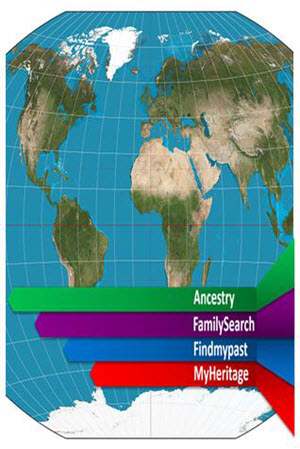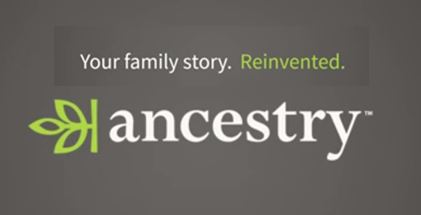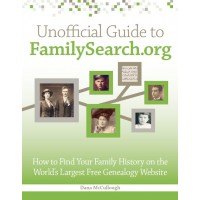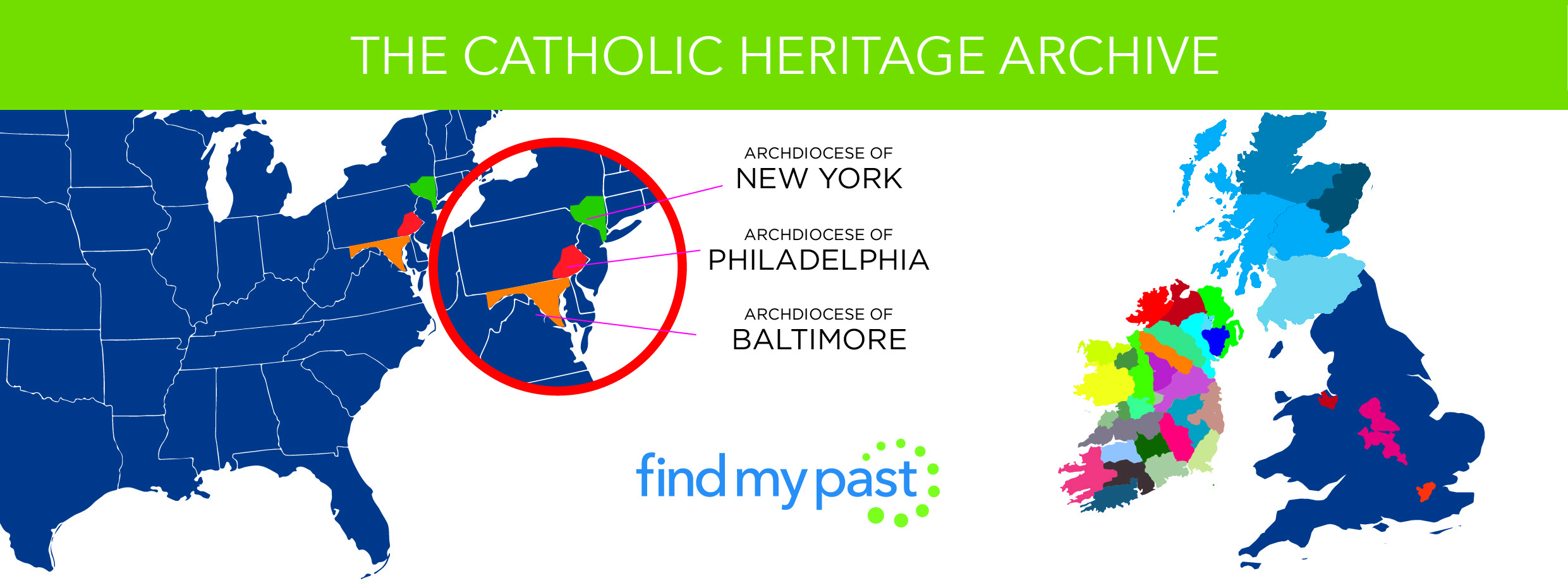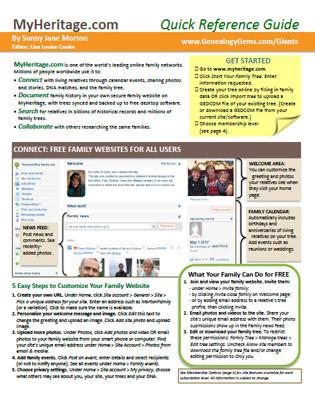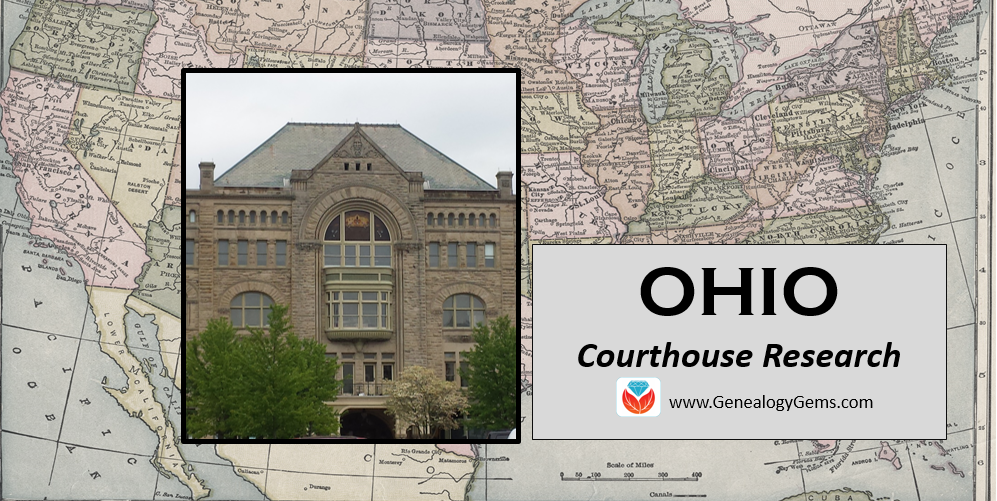Blog

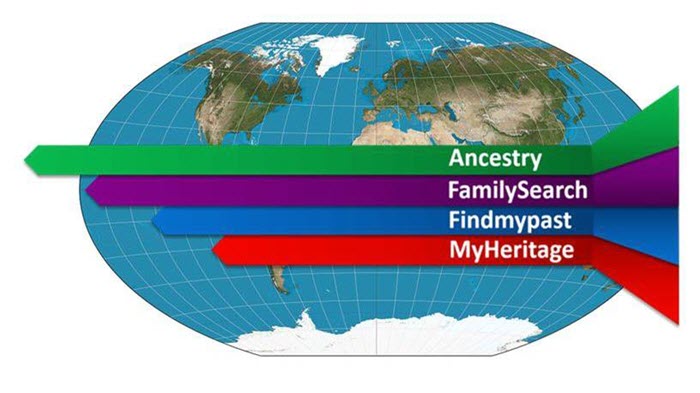
New Genealogy Records on the Genealogy Giants
Millions of new genealogy records for Australia, the British Isles, the U.S., Canada, Europe, and Central and South America have been added to Ancestry.com, FamilySearch.org, Findmypast.com and MyHeritage.com, the “genealogy giants.”
This week, we’ve sorted them by site, in case you’re just using one or two of them. But we do think you should know about them all! Click here for in-depth comparisons of the genealogy giants.
New genealogy records on Ancestry.com
Australia. Subscribers may search a new collection, Victoria, Australia, Asylum Records, 1853-1940. According to the description, “This collection is comprised of Asylum Records between 1853-1940 from the Public Record Office Victoria. The following information will typically be found: name of patient, age and birth place of patient, date admitted into asylum, reason they were admitted and photographs also occasionally appear.”
England. The new collection, Worcestershire, England, Extracted Church of England Parish Records, 1541-1812, “is a collection of historical parish registers from Worcestershire, England…The records include baptisms/christenings, burials, marriages, tombstone inscriptions, obituaries, tax lists, wills, and other miscellaneous types of records. All of the data was converted as it was originally presented in various published registers and books.”
Another new collection, Liverpool, England, Electoral Registers, 1832-1970 “contains yearly registers listing names and residences of people in Liverpool, who were eligible to vote in elections. These year-by-year registers can help place your ancestors in a particular place and possibly also reveal a bit about property they owned.”
Poland. A new index, USHMM: Poland, Jewish Holocaust Survivors Registered in Warsaw, 1945-1946, “was indexed by World Memory Project contributors from the digitized holdings of the United States Holocaust Memorial Museum…This database contains more than 31,000 registration cards completed by Jewish survivors in Warsaw after the war, in order to register with the Central Committee of Polish Jews (Centralny Komitet Żydów w Polsce). While the cards themselves were compiled in Warsaw, only 15,270 individuals have Warsaw listed as their postwar residence. The original documents are held by the Emanuel Ringelblum Jewish Historical Institute in Warsaw, Poland.”
New York. A new collection, New York State, Marriage Index, 1881-1967 “consists of indexes of marriages from the state of New York between the years 1881 and 1967. The collection contains only indexes to records, but the certificate number can be used to order a copy of the original certificate. Details vary, but may include names of bride or groom, marriage date, and place and certificate number.
Scotland. The new collection, Edinburgh, Scotland, Electoral Registers, 1832-1966, “contains yearly registers listing names and residences of people in Edinburgh, Scotland, who were eligible to vote in elections.” Another new collection, Fife, Scotland, School Admissions and Discharges, 1867-1916, “is a collection of School Admission and Discharges for schools in Fife, Scotland…These records are lists of children who were admitted to and discharged from schools. When education was required, children could be discharged from their schooling if they were needed to work to help support the family. The records vary by school and some are more detailed than others.”
United Kingdom. A new Ancestry.com collection, UK, Registers of Employees of the East India Company and the India Office, 1746-1939, “lists the employees, both civil and military, of the East India Company and later, the India Office. You may be able to find (where available): Name, Military Rank, Place of residence or military service, Date of death, Place of death, Date of marriage and Name of parents.”
New genealogy records on FamilySearch.org
Because there’s so much to find on FamilySearch.org (in so many different places), we recommend you consult an expert resource like the Unofficial Guide to FamilySearch by Dana McCullough.
Check out these collections—all of them free:
Australia. Over a half million indexed records have been added to the collection, Australia Cemetery Inscriptions, 1802-2005. The site describes the collection as “Cards of cemetery inscriptions from many cemeteries throughout Australia. The majority of the cemeteries are in Queensland, but there are some in New South Wales, Norfolk Island, Tasmania, and Western Australia. Some cards include information culled from local newspapers which sometimes include birth and marriage announcements.”
Austria. Nearly 200,000 digital images and nearly 300,000 indexed names have been added to Austria, Vienna Population Cards, 1850-1896. These are described as “population cards for individual residents of the city of Vienna, Austria. The cards include: name; birth date and place; marital status; old and new places of residence; and dates of arrival and departure. Frequently the names of the spouse and children are listed. Many people from the Austro-Hungarian Empire and Eastern Europe passed through Vienna and may be included on these cards.”
Brazil. Nearly 100,000 indexed names have been added to Brazil, Santa Catarina, Catholic Church Records, 1714-1977. These are “baptism, marriage, and death records created by various Catholic parishes and diocese in the state of Santa Catarina. Some of these records have been indexed and are searchable as part of this collection.”
Colombia. A new collection with more than 170,000 indexed names is Colombia, Diocese of Barranquilla, Catholic Church Records, 1808-1985. These are “Catholic Church records created by parishes in the Diocese of Barranquilla, Colombia. These records include: baptisms, confirmations, marriages, marriage investigation files, deaths, and indexes. Some of these records have been indexed and are searchable as part of this collection. Additional indexed records will be published as they become available.”
El Salvador. Nearly 200,000 indexed names have been added to El Salvador Civil Registration, 1704-2001. According to the description, these records are “Births, marriages, deaths, indexes and other records created by civil registration offices in El Salvador.”
Peru. Nearly 275,000 indexed names have been added to Peru, Lima, Civil Registration, 1874-1996. These are “births, marriages, deaths, indexes and other records created by civil registration offices in the department of Lima, Peru.”
Russia. Over 180,000 record images have been published online in a new collection, Russia, Karelia Poll Tax Census (Revision Lists), 1782-1858. These are “images of family lists for the tax-paying population (about 95% of the population) conducted primarily in the years 1782, 1795, 1811, 1816, 1833-1834, 1850-1851, and 1857-1858. Some outlying years are included. Localities reflect the places that existed during the period of the Russian Empire since the records were created at that time.”
New genealogy records on Findmypast.com
England: Derbyshire Parish Records. “Brand new records covering the parishes of Alvaston, Boulton, Chellaston, Holbrook, Longford, Newton Solney and Wilne have been added to our collection of Derbyshire Parish records, including: 255,626 baptisms; 126,083 marriages; and 16,902 burials.…Parish records generally begin from 1538 after the Church of England mandated the keeping of parish registers in 1537. Baptisms, marriages and burials were all recorded in a single volume until 1774, when the law changed to require a separate marriage register and another one for banns (or proclamations of an intent to marry). Standardized forms for these registers appeared in 1812.”
US Catholic parish records
- Illinois (Archdiocese of Chicago). Search over 411,000 baptismal registers, over 153,000 parish marriage records, over 37,000 parish burial records and over 1.9 million cemetery records (burial index cards, burial registers, daily burial logs, and registers of cemetery lot owners). The parish records span from the late 1800s up to 1925 and the cemetery records from 1864-1989. In baptismal records, discover the date and location of baptisms, the names of parents and family residence. Marriage records include “the couple’s marriage date, marriage location, the names of their parents and the names of any witnesses.” All have both transcripts and images of original records. The Archdiocese of Chicago was first established in 1843 and serves the Catholic population of Cook and Lake Counties in northeastern Illinois.
- Maryland (Archdiocese of Baltimore). Subscribers may now browse “over 54,000 individual baptism, marriage, burial, communion, and confirmation registers from the Archdiocese of Baltimore in their entirety. The registers span the years from 1782 to 1918 and can provide a variety of important biographical details about your ancestor.” Click here to start browsing!
- New York (Archdiocese of NY). “Search brand new indexes of Sacramental Registers, released in partnership with the Archdiocese of New York, of both baptisms and marriages “covering the boroughs of Manhattan, the Bronx and Staten Island in New York City, as well as the Counties of Dutchess, Orange, Putnam, Rockland, Sullivan, Ulster, and Westchester. The records date back to 1785, span more than 130 years of the region’s history and come from more than 230 parishes across the Archdiocese.
New genealogy records on MyHeritage.com
Get the most out of MyHeritage.com, a genealogy giant with a global user base and free family websites! Check out our essential (yet inexpensive) MyHeritage.com Quick Reference Guide, available in the Genealogy Gems store.
England & Wales: 1939 Register. This huge addition was announced during RootsTech 2018 last week. According to a press release, “Prepared on the eve of World War II, with 33 million searchable records, the 1939 Register is the most complete census-like collection for the population of England and Wales between 1911 and 1951….For each household member, the 1939 Register records name, gender, address, birth date, marital status, place of residence, and occupation….The 1939 Register collection is not exclusive, but other than MyHeritage, it is currently available on only one other website [Findmypast.com]. The initial collection on MyHeritage includes an index, without images.”
Canada: Canadian Obituaries, 1997-2017 is a new collection of “2 million records, documenting obituaries and memorials from the 10 Canadian provinces, spanning mostly 1997-2017. It includes the name of the deceased, the date of death, the publication source including locality information, and the text of the obituary or memorial — in English or French depending on the source. When available, a photograph of the deceased is also included.”
Share with your friends!
Who do you know with ancestors in Australia? England? Scotland? Austria? The United States? Poland? Brazil? Peru? Russia? The other countries mentioned above? Why not take a second and share this post with them? Thank you–you’re a gem!
Disclosure: This article contains affiliate links and Genealogy Gems will be compensated if you make a purchase after clicking on these links (at no additional cost to you). Thank you for supporting Genealogy Gems!

About the Author: Sunny Morton
Sunny is a Contributing Editor at Lisa Louise Cooke’s Genealogy Gems; her voice is often heard on the Genealogy Gems Podcast and Premium Podcasts. She’s known for her expertise on the world’s biggest family history websites (she’s the author of Genealogy Giants: Comparing the 4 Major Websites); writing personal and family histories (she also wrote Story of My Life: A Workbook for Preserving Your Legacy); and sharing her favorite reads for the Genealogy Gems Book Club.
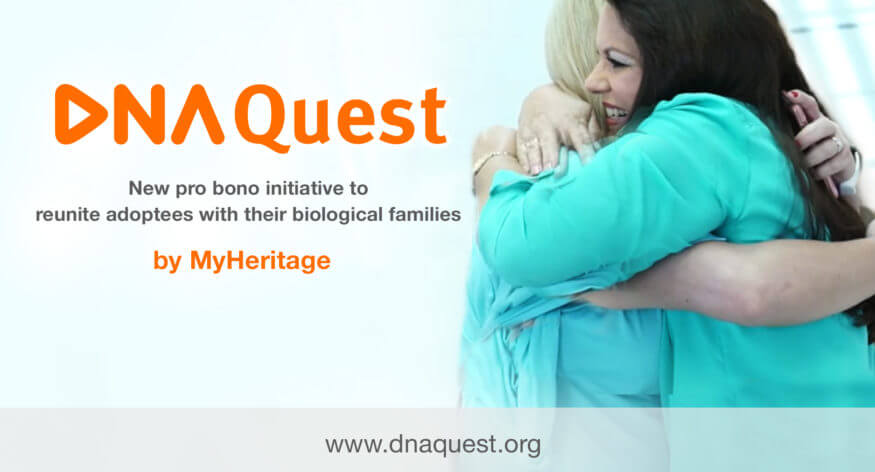
Major Pro Bono DNA Testing Initiative for Adoptees
MyHeritage Launches DNA Quest:
A Major Pro Bono Initiative for Adoptees and Their Biological Families to Find Each Other via DNA Testing
MyHeritage will distribute 15,000 DNA kits, worth over one million dollars, for free in the first phase of this initiative. Here’s the scoop:
TEL AVIV, Israel & LEHI, Utah–(BUSINESS WIRE)–MyHeritage, the leading global destination for family history and DNA testing, announced today the launch of a new pro bono initiative, DNA Quest, to help adoptees and their birth families reunite through genetic testing. As part of this initiative, MyHeritage will provide 15,000 MyHeritage DNA kits, worth more than one million dollars, for free, with free shipping, to eligible participants. Participation is open to adoptees seeking to find their biological family members, and to anyone looking for a family member who was placed for adoption. Preference will be given to people who are not able to afford genetic testing. The first phase of the initiative is open to USA residents, involving adoptions that took place in the USA. Application opens today on the project website, www.dnaquest.org, which includes detailed information about the initiative.
Introducing DNAQuest,org A Pro Bono Initiative for Adoptees and their Biological Families to reunite via DNA Testing – Tweet this
Many of the approximately 7 million adoptees living in the USA today are searching for their biological parents or siblings. The search is time-sensitive, because every year some of the people who are searching pass away, missing the opportunity to reunite. Currently, the main avenues for adoptees and their biological parents to find each other are adoption agencies, registries created for this purpose, and genetic testing. With formal adoption records being unavailable or difficult to obtain in most states, genetic genealogy opens new doors in the search for relatives, and MyHeritage believes everyone should be able to access this valuable technology.
To maximize the potential of this initiative to successfully reunite families, MyHeritage has set up an advisory board of top experts in the fields of genetic genealogy and adoption to guide and support this initiative on a voluntary basis. This alliance ensures the best possible professional support for participants, with each advisory board member bringing unique expertise. The advisory board includes: CeCe Moore, founder of The DNA Detectives; Blaine Bettinger, The Genetic Genealogist; Richard Weiss of DNA Adoption; Richard Hill, DNA Testing Adviser; Katharine Wall, founder of Adopted.com; Brianne Kirkpatrick, founder of Watershed DNA; Pamela Slaton, investigative genealogist; Leah Larkin, The DNA Geek; and Susan Friel-Williams, Vice President, American Adoption Congress.
DNA Quest is an expansion to the USA of another one of MyHeritage’s successful pro bono projects to reunite adoptees from the Israeli Yemenite community with their biological families. In that project, MyHeritage facilitated successful reunions between adoptees and their biological siblings, solving challenging cases where the protagonists were searching for each other without success for more than 60 years.
“We have a company culture of using our resources and technology for the greater good. In this spirit we’ve initiated several significant pro bono projects, such as returning looted assets from WWII to their rightful owners and documenting family histories and traditions of tribal peoples who lack access to modern technology. DNA Quest is a natural extension of these efforts,” said MyHeritage Founder and CEO Gilad Japhet, who conceived DNA Quest. “There is a great need for a project like this — to help adoptees find their biological families — and we are the right company to take it on. We’ve already successfully reunited many families and are confident that through this initiative, together with a wonderful alliance of top experts, we’ll be able to utilize the power of genetic genealogy to help many more.”
“Few things are more fulfilling than a life-changing adoptee-family reunion”, said CeCe Moore, founder of DNA Detectives, the largest group on Facebook that brings together volunteers with genetic genealogy and searching experience, and those seeking biological family. “I’m very excited to be a member of the DNA Quest advisory board and look forward to assisting participants in finding the lost loved ones for whom they are yearning.”
There are already more than 1.25 million people in the MyHeritage DNA database — one of the fastest growing among the major DNA companies. Additionally, MyHeritage is unique among the top three DNA companies to offer the option to upload DNA results from other test providers, and this is available for free. The company is uniquely positioned to reunite families and has indeed facilitated many emotional success stories, with more taking place in every passing day.
Adoptees and family members searching for their biological relatives can apply for a free MyHeritage DNA kit at DNAQuest.org through April 30, 2018. Participants will be selected, and their free DNA kits will be shipped to them by the end of May 2018. Results are expected as early as July 2018.
Those who have already taken a DNA test with another company can upload their DNA data to MyHeritage for free and participate in this initiative as well.
The privacy of all applicants and participants will be strictly enforced. The DNA is owned by the participants and not by MyHeritage. The company has never sold genetic data and has pledged to never do so in the future without users’ explicit consent. DNA Quest is a pro bono project without gotchas or caveats.
About MyHeritage
MyHeritage is the leading global destination for family history and DNA testing. As technology thought leaders, MyHeritage has transformed family history into an activity that is accessible and instantly rewarding. Its global user community enjoys access to a massive database of historical records, the most internationally diverse collection of family trees and groundbreaking search and matching technologies. Launched in November 2016, MyHeritage DNA is a technologically advanced, affordable DNA test that reveals ethnic origins and previously unknown relatives. Trusted by millions of families, MyHeritage provides an easy way to find new family members, discover ethnic origins, and to treasure family stories, past and present, for generations to come. MyHeritage is available in 42 languages. For more detail, visit www.myheritage.com. DNA Quest is available on www.dnaquest.org.

About the Author: Lisa Louise Cooke
Lisa is the Producer and Host of the Genealogy Gems Podcast, an online genealogy audio show and app. She is the author of the books The Genealogist’s Google Toolbox, Mobile Genealogy, How to Find Your Family History in Newspapers, and the Google Earth for Genealogy video series, an international keynote speaker, and producer of the Family Tree Magazine Podcast.
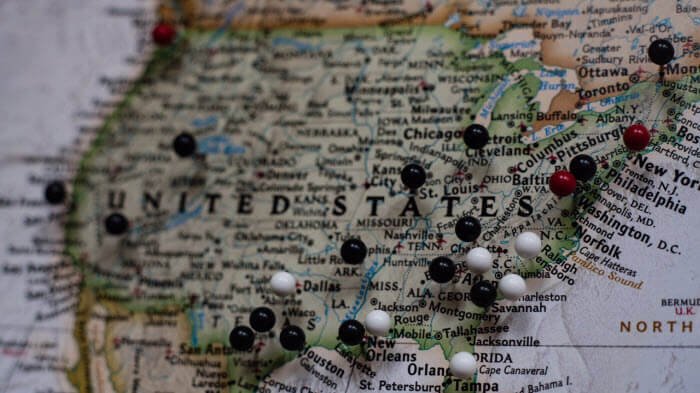
New State Genealogy Records Online
Local and state genealogy records can be some of the best resources for tracing your family history in the United States.
Check out these new or updated collections from 15 different states: AR, FL, GA, ID, IL, IN, MD, MA, NE, NJ, NM, NC, SC, TX and WY.
State genealogy records now online
Arkansas. The University of Arkansas at Little Rock website reports that “a history class at the University of Arkansas at Little Rock has created a new digital index of Phillips County death certificates from 1917 to 1922. Dr. Brian Mitchell’s American Urban History Class created the index during the fall 2017 semester and donated the archive to the Arkansas History Commission so it can be made available for public use.”
Florida. Subscription website Newspapers.com recently added these titles: “Tampa Bay Times (formerly the St. Petersburg Times), as well as the Tampa Tribune and the Tampa Times.” According to the site, “The Tampa Bay Times, currently Florida’s largest paper, got its start in 1884 as a small weekly paper called the West Hillsborough Times. During the 1890s, the paper moved to St. Petersburg and the name was changed to the St. Petersburg Times, a title it would retain for more than a century.”
Also: the Florida Department of Law Enforcement has created a new statewide database of “cold cases.” It features more than 400 unsolved cases, according to this article.
Georgia. The blog of the Digital Library of Georgia has announced “the addition of over 10,000 digitized pages of African American funeral programs to the Augusta Public Library’s Eula M. Ramsey Johnson Memorial Funeral Program Collection. Spanning 1933-2017 and consisting of over 3,000 programs, the digital collection provides both a rich source of genealogical information and local history about the African American community. Programs are freely available online through the DLG.”
Also at the Digital Library of Georgia: Henry L. Benning Civil War materials are now available online. During the Civil War, Henry L. Benning “served as Colonel of the 17th Georgia Infantry in twenty-one engagements including Antietam, Gettysburg, and Chickamauga… Benning’s war correspondence deals with his service throughout the war and includes orders sent to him, reports of engagements, both those sent to him and those he submitted to his superiors.”
Idaho. Genealogy giant Findmypast.com has published Idaho, Southeast Counties Obituaries 1864-2007. The collection includes over 9,000 browsable images of “obituaries collected and printed in various Idaho newspapers. The collection is not confined to deaths that occurred in Idaho; obituaries of native Idahoans who died out of state were sent in to Idaho newspapers and are also included. Discover biographical details including key dates and life events of those included in these records.”
Another of the giants, Ancestry.com, has published Idaho, Old Penitentiary Prison Records, 1882-1961. According to the collection description, “This collection contains prison records from between the years of 1882 and 1961. The various documents found in this collection may contain the following information: name of inmate, age and race of inmate, birth date and place, marriage date and place, date of trial, date of pardon, date of conviction, spouse of inmate and other miscellaneous information such as physical attributes and the crime committed may be found.”
Illinois. Illinois State University reports that back issues of the university newspaper, The Vidette, are now online. “The archive currently holds approximately 75 volumes—from the first edition dating back to February of 1888 to May of 1963. Within those 75 volumes, there are 2,621 issues and over 21,300 pages. The Vidette Digital Archives plan to continue adding more volumes in the future.”
Indiana. Now at genealogy giant and subscription website MyHeritage.com is a collection of Indiana Newspapers, 1847-2009, a collection of 1,014,820 pages in 44 newspaper titles. The largest numbers of pages come from The Rochester Sentinal, Times-Union, The Madison Courier, Warsaw Times-Union, The News-Sentinel, Warsaw Daily Times and Warsaw Union.
Maryland. MyHeritage.com has also published Maryland Newspapers, 1790-2009, a collection of 475,492 pages in 10 newspaper titles. Titles in this collection include (Baltimore) Afro-American, (Baltimore) American and Commercial Advertiser, Baltimore Herald, The Hancock News, The Maryland Herald, The Weekly Herald, The Baltimore Bee and American Eagle.
Massachusetts. The New England Historic Genealogical Society has recently added to its collections on AmericanAncestors.org:
- new parishes available in the image-only Archdiocese of Boston database, Massachusetts: Roman Catholic Archdiocese of Boston Records, 1789-1900: Anthony of Padua (Brighton), St. Margaret (Dorchester), St. Rose of Lima (Chelsea), fourteen volumes from St. Stephen’s in Boston’s North End (this parish was initially known as St. John the Baptist, and served primarily Irish immigrants); and St. James the Greater in Boston is located in what is now Chinatown, although many Irish immigrants lived in the neighborhood in the 1800s.
- new sketches in Western Massachusetts Families in 1790. This database focuses on families listed in the 1790 census in historic Berkshire and Hampshire Counties, an area which also includes parts of modern Franklin and Hampden Counties. The new sketches are: Asaph Stebbins, Daniel Smith, Eldad Parsons, Elijah Bardwell, Israel Cowles, John Cowles, Sr., Joseph Bardwell, Joseph Bardwell, Jr., Martin Bardwell, Obadiah Bardwell, and Timothy Cowles.
- new volumes in Mayflower Families Fifth Generation Descendants, 1700-1880: Billington, John (Vol. 21), Hopkins, Stephen (Vol. 6), and Alden, John (Vol. 16, part 5).
Nebraska. Subscription site Newspapers.com reports these new additions to its lineup: “the Lincoln Journal Star and some related papers: the Lincoln Star, the Nebraska State Journal, the Weekly Nebraska State Journal, the Sunday Journal and Star, the Courier, and the Lincoln Evening Call. Coverage for the Lincoln Journal Star alone spans more than a century (1881-2009) and includes nearly 1.6 million newspaper images.
New Jersey. Genealogy giant MyHeritage.com has published New Jersey Newspapers, 1859-1946, a collection of 277,295 pages in 7 newspaper titles. Titles in this collection include Paterson Daily Press, Daily True American, Newark Sunday Call, Camden Democrat, The Bayonne Herald, The Paterson Weekly Press, The Political Intelligence and New Jersey Advertiser.
New Mexico. Ancestry.com has published a new database relating not just to New Mexico history but the “old” Mexico that preceded it. Materials in the collection New Mexico, Census, Military, and Other Records of Mexico, 1821-1846 “vary but include records from the provincial administration, treasury, legislative, local government, judicial cases, military, Indian affairs, and some period newspapers. Lists in the hacienda, military, and miscellaneous record groups have been indexed; other record groups can be browsed by year and record group.
North Carolina. The State Archives of North Carolina announced a new digital collection: Secretary of State Wills. “The digital collection contains wills from 1663 to 1789. These are loose original wills probated in the province. After 1760 most original wills were kept by the clerk in the county in which they were probated, though there are some wills after 1760 in the collection.”
Additionally, more newspaper content continues to appear on Digital North Carolina. Click the announcements below to read more details:
- Twelve More Years of the [Madison] News-Record
- Smithfield Herald [Johnson County]
- Franklin Times [Louisburg] now covering 1909-1944 and 1963-1972
- 11 More Years of the Carteret County News-Times
- 70 years of Mars Hill University student newspaper
- New Issues of the Pilot
South Carolina. A new digital history resource explores Latino history and communities in the Low Country. “Las voces del Low Country” is the name of the exhibit and it “documents the little-known history of Latinos in the Charleston area through oral interviews conducted between 2012 and 2014, photographs, historic documents, and artistic images.” Click here to read more about it.
Also, Findmypast.com has published (or updated) several collections relating to South Carolina:
· South Carolina, Will Transcripts 1782-1866 (an index to more than 181,000 will transcripts)
· South Carolina, Plats for State Land Grants 1784-1868 (an index to more than a quarter million records)
· South Carolina, Legislative Papers 1782-1929 (more than 228,000 records)
· South Carolina, Criminal Court Records. (transcripts for 1769-1944)
· South Carolina, Records of Confederate Veterans 1909 – 1973 (index of lists and pension applications)
Texas. Findmypast.com has published Texas, Laredo Arrival Manifests 1903-1955, with over 1.3 million records. “Explore images of arrival manifests from the border town of Laredo in Texas. This National Archives and Records Administration (NARA) collection will enable you to discover your ancestors’ names, ages, nationalities, and physical descriptions.”
Wyoming. The University of Wyoming has put online a digitized version of a state atlas designed for use by schoolchildren. But these maps may be valuable for understanding the geography of your Wyoming ancestor’s life, too. Click on the Interactive web pages tab to see a list of maps. Among them are those relating to physical geography, but also related to people. For example, there are maps showing emigrant trails, landmarks and forts; railroad expansion, stage roads and cattle trails; migration in and out of the state; land ownership and more.
More state genealogy records and tips
Local and state research is often the key to discovering your U.S. ancestors! Read these articles for more gems on finding genealogy resources in states and locales across the country.
- Ohio genealogy research and the virtual courthouse
- West Virginia genealogy research and working with changing county boundaries
- “Deeper into census records”–Family History: Genealogy Made Easy Podcast episode #10 includes info on state-level censuses. Listen for free!

About the Author: Sunny Morton
Sunny is a Contributing Editor at Lisa Louise Cooke’s Genealogy Gems; her voice is often heard on the Genealogy Gems Podcast and Premium Podcasts. She’s known for her expertise on the world’s biggest family history websites (she’s the author of Genealogy Giants: Comparing the 4 Major Websites); writing personal and family histories (she also wrote Story of My Life: A Workbook for Preserving Your Legacy); and sharing her favorite reads for the Genealogy Gems Book Club.
Disclosure: This article contains affiliate links and Genealogy Gems will be compensated if you make a purchase after clicking on these links (at no additional cost to you). Thank you for supporting Genealogy Gems!

